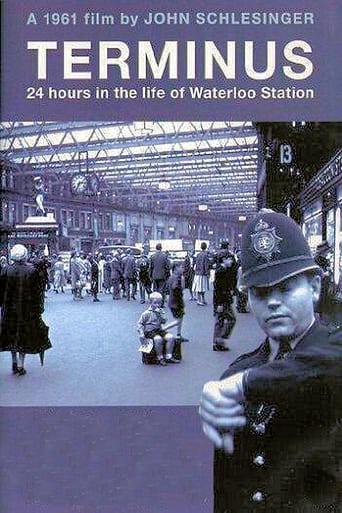James Hitchcock
British Transport Films was an organisation set up in 1949 to make documentary films on the general subject of British transport, in the same way as the GPO Film Unit had been set up in the 1930s to make films about the work of the Post Office. "Terminus" is one of their productions and takes a look at an ordinary day at Waterloo station in London. It was the first film to be directed by John Schlesinger, who later became one of Britain's best-known directors of feature films.British documentaries were normally made with the express purpose of educating the public about some topic of general interest, or at least about some topic which the film-makers perceived as being of general interest, and in order to do so normally presented the viewers with a didactic voice-over by an unseen narrator, sometimes backed up by "talking head" interviews. There is none of that in "Terminus". Schlesinger dispenses with narration altogether; the only dialogue we hear consists of conversations between the people we see. This was a style of documentary which became known as "fly-on-the-wall", showing but not telling.We see a wide cross-section of passengers- male and female, old and young, white and black. (There are numerous black faces featured, a reminder that the late fifties and early sixties were a period of increasing immigration into Britain). We also meet a number of those who work at the station or on the railways- the stationmaster, guards, porters, a signalman (who keeps a cat in his signal box), ticket-sellers, lost-property workers- although, surprisingly, no engine-drivers.The film was nominated for a BAFTA for Best Documentary and also for an Academy Award for Best Documentary Feature, although it was disqualified from this latter category because it had been released before the eligibility period. (Also, it seems rather too short to qualify as a "feature"). It was evidently well-regarded when it first came out in 1961, possibly because this style of film-making was something of a novelty at the time, and it certainly has some features which still catch the eye fifty-odd years on. Chief among these is Schlesinger's striking camera-work; he seems particularly fond of alternating "fly-on-the-wall" close-ups with "bird's-eye view" long-shots looking down on the station from a height.Unlike the more traditional style of documentary, however, this one does not tell us much about British transport, even British transport as it existed in the early sixties, except that steam was still the main source of power at the time (and we probably knew that anyway). It didn't come as a great surprise to learn that the film is not as "documentary" as it makes out, as some of the shots were staged using actors. The scenes of the young boy Matthew Perry who is supposedly lost by, and then reunited with, his mother struck me as an obvious fake even while watching the film, but this was not the only sequence in which actors were used. (This "Matthew Perry" is not the future "Friends" actor, who was not born until 1969).The whole idea behind British Transport Films seems to have been to inform the public about British transport. In "Terminus" Schlesinger has given us some visually arresting images, but I cannot say that he has fulfilled his remit of enlightening us.
ztbyford
This documentary, from the very first shot of the bee keeper on the roof of Waterloo station, gives a riveting, imaginative and very witty picture of a typical day in the life of a large railway station, but it's main value in the insight it gives into human nature - by simply looking at people going about their daily business the camera paints a many-layered picture of the human psyche. Always fascinating, often funny and sometimes frightening, this film must be one of the greats of documentary cinema. I hope the sad death of John Schlesinger will prompt a revival of his early - and definitely his greatest - films.
PhilAP
I can't honestly vote for this film, but not because I don't like it. I do.Because I knew some of those responsible it would be wrong to award "Terminus" maximum marks though I would.John Schlesinger made "Terminus" for BTF and was given a virtually free hand. All the characters were real people and the only contrived situation was the "little boy lost". He was a relative. He wasn't acting which, while a little cruel, was great film-making.The lad had a hell of a treat later!The Waterloo shown was real when "Terminus" was made which is why so much seems dated now. The "bag-lady" refused the amateur payment Equity had negotiated. When she died the film crew made sure she had a decent funeral. That was all they could do.The film was ground-breaking in it's way. Ciné Vérité was never the same again.
tramsbottom
This fly on the wall-style documentary from 1961 won an Oscar for best documentary. It is about an average day in the life of a busy train station. By todays standards it looks dated but the camera work and pace of the film are quite ahead of their time. It doesn't go on and on like most boring docu's, but just shows us the facts, how they are (a family saying goodbye to a relative leaving on a train, a little boy who gets lost) and nothing more. We make up our own minds. It is easy to see where a lot of modern film-makers might have stolen their ideas from. Not a great film, but not a bad one either.




